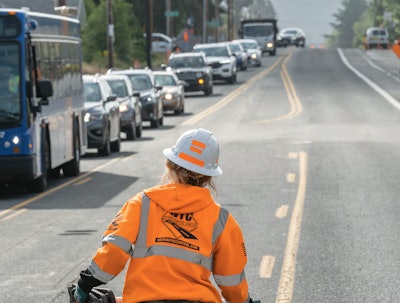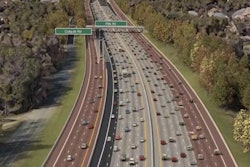
State senators are considering an emergency funding bill that would add more revenue for the Oregon Department of Transportation, which faces a $354 million shortfall and more than 480 layoffs.
House Bill 3991 was introduced August 29 during a special session after state legislators failed to pass a transportation funding bill during the regular session.
According to the Association of Oregon Counties, the bill would generate an estimated $700 million every two years through the following actions:
- $0.06 per gallon gas tax increase.
- $42 increase in all registration fees.
- A new, additional $30 registration fee for electric vehicles and 40-plus-miles-per-gallon vehicles.
- $139 increase to title fees.
- Phased-in mandatory electric-vehicle and hybrid road user charge beginning July 2027.
- Updated heavy truck and diesel taxes.
- New ODOT accountability measures.
According to ODOT, a combination of flattening gas taxes, high inflation and restrictions on available funding have caused a shortfall in the department’s State Highway Fund that could lead to the largest layoff in the department’s history. The department faces a $354 million deficit between the expected funds it will have for the 2025-2027 biennium and required funds to maintain current staff and service levels.
Governor Tina Kotek called the current special session, which began August 29, in July, while simultaneously directing ODOT to postpone planned layoffs for 45 days. The bill passed the Oregon House on September 1 and its third reading in the Senate is scheduled for September 17.
In a September 2 press release, Kotak again directed ODOT to delay upcoming layoffs until October 15 while the Senate works to pass the bill. ODOT had been in the process of laying off 483 employees and eliminating another 449 vacant positions. The department also planned to close several maintenance facilities.
ODOT has said that, should it fail to acquire more funding, drivers can expect, among other issues, longer road closures, worse winter driving conditions, increased crash response times and more potholes.
ODOT partly attributes lower gas tax revenue to the growing popularity of electric and more fuel-efficient vehicles. Oregon’s gas tax of 40 cents per gallon also does not track with inflation.
ODOT has cut almost $300 million in the last five years to increase efficiency, consolidate facilities and defer maintenance, the department says.
A key issue surrounds the use of currently available state funds. State law requires ODOT to spend almost all additional funding under its last transportation package in 2017 on projects. Those funds cannot be redirected to offset the State Highway Fund’s shortfall.
The current funding structure, according to ODOT, also impacts how county and city transportation departments pay for their roads.
ODOT also says the short-term delaying of maintenance like pavement repairs and cleaning culverts will lead to larger issues down the road, such as bridge and road closures when these structures deteriorate faster without regular maintenance.
Earlier this year, the Oregon Legislative Assembly commissioned an independent managerial review of ODOT from engineering and construction firms AtkinsRéalis and Horrocks to examine its delivery on major projects and its organizational structure.
The report acknowledges ODOT has faced “increasing demands and growing project complexity” in recent years, which has “revealed areas where ODOT’s current practices and organizational structure could benefit from improvement.”
Part of this can be attributed, according to the report, to a larger pool of transportation revenue passed in 2017, growing public demand for accountability and new mandates for regional and intermodal coordination.
The report alleges that ODOT has failed to consistently keep pace with the changes it has faced in the last few years, resulting in cost overruns, schedule slippage, overlapping responsibilities between offices and uneven application of standards.











